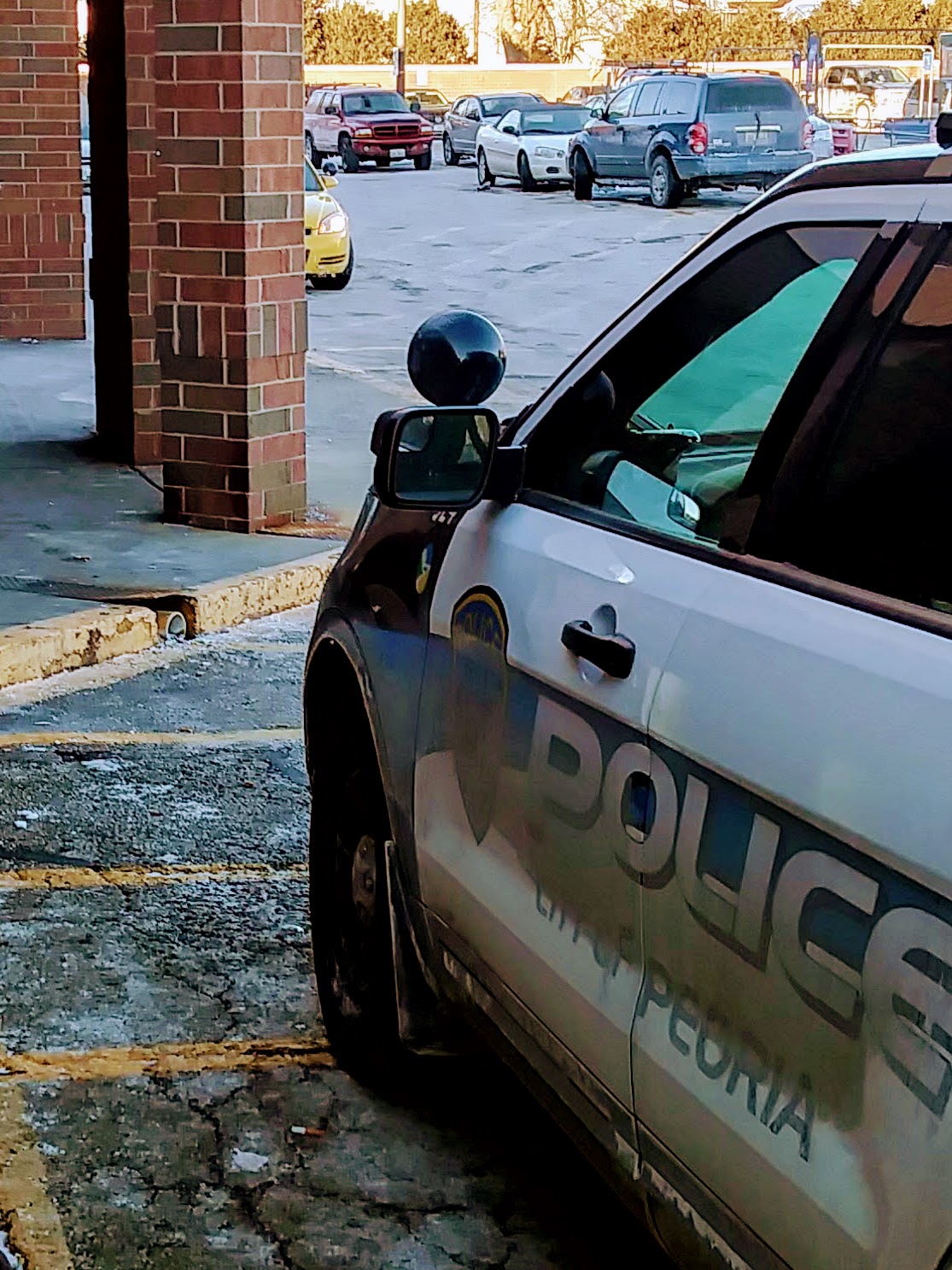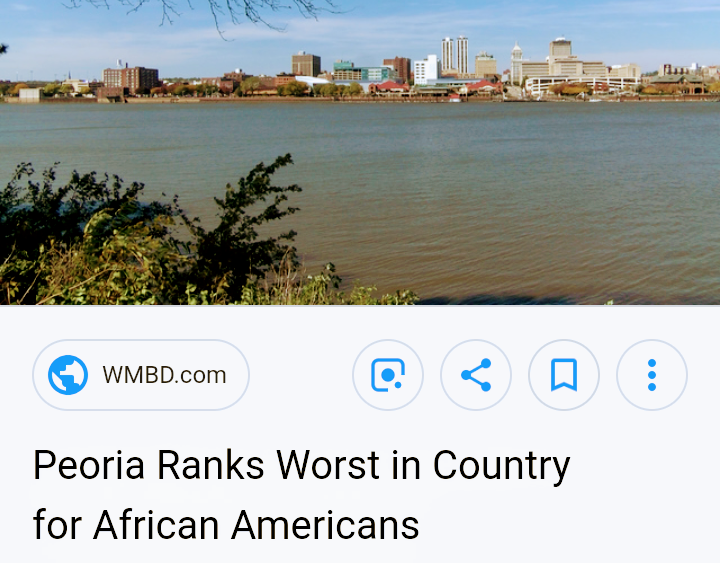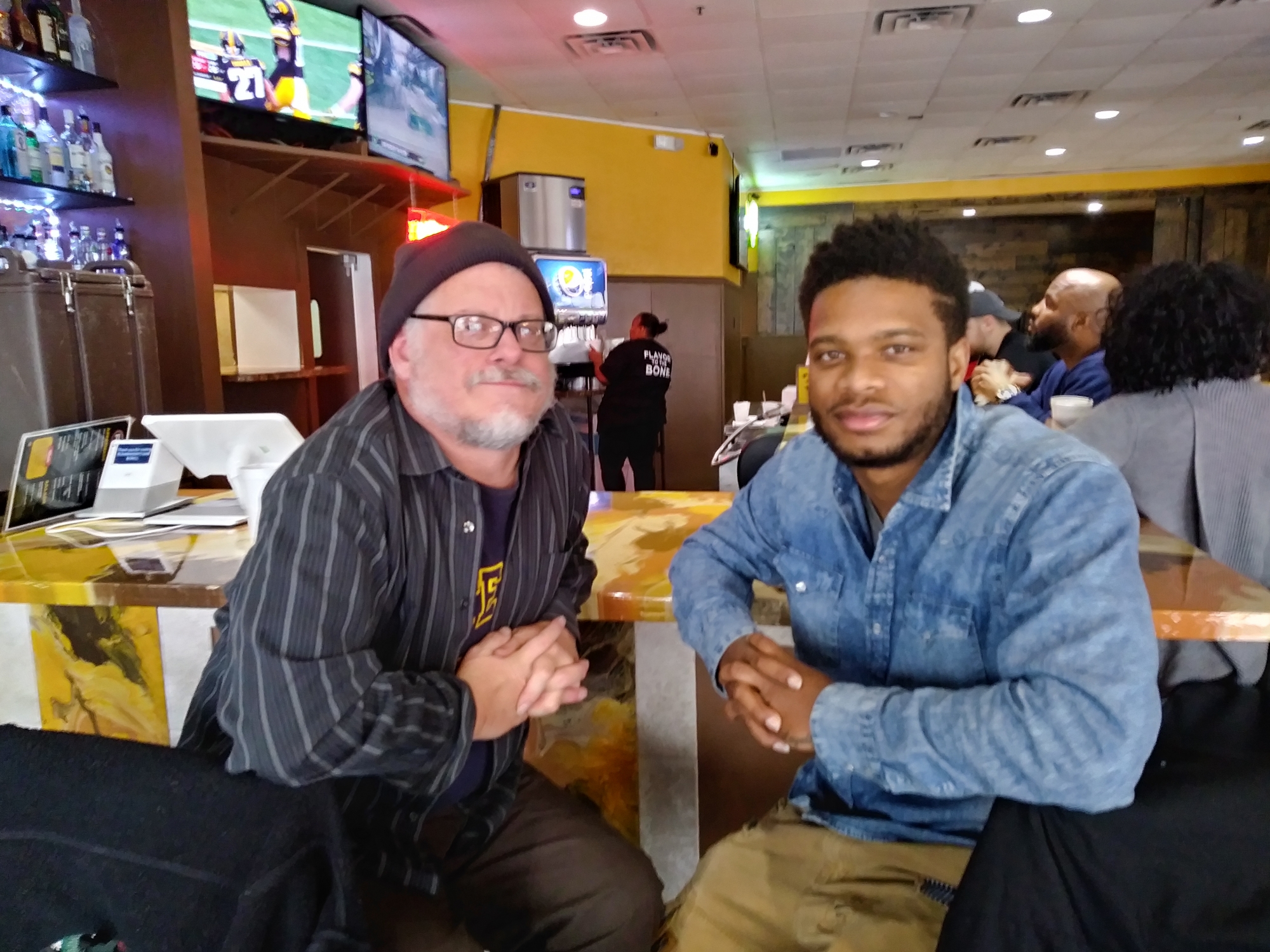P’TROIT PRESSURE ——— NO. 1 NATIONWIDE
This is part 3, the conclusion of my interview with local musical artist and business entrepreneur Rich P Evolon, creator of “Welcome to Peoria,” a profane and profound rage on the American dream dystopia that plays all day every day right here in River City.
The main focus of my Democratic-Socialist run for Peoria city council is creating an effective voice for our working-class neighborhoods — East Bluff, South Side, North End, Center Bluff and more — left behind by the majority white population & all higher income brackets fronted by the former and current regimes now occupying city hall. Evolon has endorsed my candidacy.
After his raw take on the constant aggressions on Peoria’s African-American community, Evolon said he wanted to discuss what nobody else would:
“A big problem within our community versus other races is like we got one parent in the house, the majority of the time,” he explained at Rumberger’s Wings & More, a thriving black-owned restaurant and sports bar on Main Street in the heart of downtown.
Is that really true?
“Most definitely. If that. You might not have any parent in the house. It’s just the kids. You got the mom all day working, and you got the dad locked up somewhere, or dead.”
Grandma involved?
“If you’re lucky. Rarely you might have a grandmother. But for the most part you got mom, and she’s at work all the time. So that leaves the kid at home by themself, at a young age. For a lot of people. A lot of people. So what’s gonna happen to that kid? When he sees his momma strugglin’‘, and he’s what, 12 years old? And he sees this situation as a young boy, as a young man. He’s gonna want to help. He’s going to want to provide for his mother.”
So that means cash?
“That’s it! Anyway that he can. And the only thing that’s around him, in the immediate proximity, is drugs. Drugs and crime. So you know, that’s why the community kind of looks at that type of stuff and kinda turns a blind eye to a lot of times because we know what it’s from. We know what it’s for. He’s doing that because he’s trying to provide. Provide for his family the best way he knows how. Before he’s ever able to work. He’s twelve. Before he’s even able to get a job.”
Of course, it’s one thing to recognize a problem, and quite another to solve it. So Evolon, 29, offered this plan.
“What I would propose is that let these kids at 11, 12, when he starts getting into these ages when they thinking about providing for their family, put them into certain programs for a trade. Not job training. Trade. Welder. Barber. So they can already be set. Because the thing is , it’s not about education with them. It’s about helping my mom pay her bills. I can’t pay my bills with this diploma! I’m sorry. I got it. You want me to go to school and get straight A’s. But Mom! You’re strugglin’! We’re barely able to have a house after I got my diploma. But after I get my diploma, where are we going?! We don’t have a home.”
And you know this how?
“That is a personal thing. And it’s very common amongst our people. We need to find programs, create programs where we can put these kids into money. We need to put some money in their pockets. Because I deal with it even when I talk to the youth. They hear you. ‘That’s cool. I hear everything you sayin’. That’s cool. But I’m broke.”
So McDonald’s at $7.25 an hour isn’t enough?
“That’s not enough. At twelve you can’t even apply for McDonald’s That’s what I trying . . . “
The pressure to get money is way before the legal age to work?
“Exactly !”
Noting that this pressure exists across the nation in the African-American community, Evolon wanted to get across the need for something far better than minimum wage way too late in the game.
“Not necessarily a job. I really wanna get that clear. Like self sufficiency. If a 13 year old right now can come into (a business site) and do some welding or do some painting. After he got certified and do it himself at 13, 14. Get a couple thousand and go back home. At 13. Because that’s what we need. Nobody’s talking about that. That’s what we need.
“Next time you see a young black 12, 13 year old, think about him trying to provide for his family, his mom, as the man of the house. I’m one of them. Those 12 year olds.”
So what did you do?
“(A knowing laugh.) That’s ah . . . That’s another interview. (Again laughs at the memories.) That’s another interview. Man, you know, I’m here today. I made it out. I . . . well, I’m not gonna say I made it out because I’m still in it. But I’m not forced. I’m not forced. That’s the whole thing about it. Not bein’ forced to live a life that you’re not meant to live. You know, that’s not for you; that’s for 35, 36 year old with two, three kids. And you’re doing this at 12, 13 years old.”
There is an upside to all the too-young real world pressure, provided you survive.
“And honestly it’s a blessing, too. Because when you grow up in that environment, if you are blessed to make it out, you can really become a CEO of a company. You can really become a marketing genius based on all the knowledge of everything that you’ve been through at the bottom level. You were forced to do it.”
The feeling that Evolon and others have always understood, that Peoria is in a class by itself, is borne out in the recent annual rankings of worst US cities for black Americans as conducted by the 24/7 Wall St.com financial website, which describes itself as “Insightful Analysis and Commentary for U.S. and Global Equity Investors”. In the past four years, Peoria has been rated no. 1 (2016), no. 2 (2017), no. 5 (2018), and no. 6 (2015).
That’s worst in the nation.
For our city’s champion worst year listing, 24/7 Wallst.com stated, “The poverty rate among black residents in Peoria is more than four times the white poverty rate of 8.2%. The black unemployment rate in the metro area is 15.3% compared to 5.4% white unemployment rate. Black Peoria residents are nearly nine times more likely to be incarcerated than white residents.” In 2017, 24/7 Wall St.com noted “The difference in age-adjusted mortality rates of black and white residents in Peoria is one of the largest in the country.”
So what did you think when you heard about these surveys consistently rating Peoria at the worst, or nearly so, in the nation for black Americans?
“It makes sense to me. It makes sense. Like when I say I went to Chicago, how, you know, people from here probably look at it like, ‘Oh, man! Chicago is . . . man, you went to Chicago?!’ But in actuality, they were looking at me (in Chicago) like ‘Man, who is this guy?! Because how I approached things. It was like I must have been through something worse than what they are use to going through.”
Than Chicago?!
“Yeah. Right. Exactly.
“That was the reason I left Peoria at 17 with no plans. I just wanted to leave because I didn’t see the chains, but I felt it. I felt it. And to hear that report 10 years later, like, it made sense. I thought, man, that made sense. Like I said, I didn’t see the chains, I felt it.”
Like a change for the worse?
“Chains! Chains, yeah.
“I felt it was a ceiling here. At 17, I felt like it was a low ceiling. After a certain point, there was nothing else you could really do here, for a black man, I would say. What else is there? I’m an entrepreneur, so whatcha want me to get . . . a job? Oh, that’s the highlight of my life? Oh. Okay. All right. What is it? What is there for me? You can’t even put a poster up on the pole around here without somebody trying to take you to jail. By doing something positive. You can’t even put a party together without the police meeting you there before any one person, one body gets in the venue. Just doing it the right way. Not harming anybody. But here you are anticipating negativity, a crime. When you see police, you’re supposed to think a crime is happening. This is a party that hasn’t even happened yet.”
In my neighborhood on Arcadia in the East Bluff, cops are cruising up and down Arcadia and Wisconsin all the time. It’s like we’re under occupation. And they’re not going to a call or nothing. What is that?
“It’s bullying. It’s bullying. It’s intimidation, it’s, it’s stalking. It’s just waiting on someone to . . . You’re huntin’. You’re on the hunt. Want me to make it plain: you’re huntin’, man. While you’re doing this, I know white boys that do a lot of crime. In Peoria. If you see where they live. How nonchalant they are about what they’re doing, It’s like ‘Wow!'”
They have no fear?
“They know nothing is comin’. Nobody’s gonna ride up their block. No police is gonna be outside their clubs when they go to have a good time, to have drinks with the guys. Nobody is gonna do anything about none of that. It’s like having a parent over your shoulder every second. And you ain’t done nothing. Here’s mom. Here’s dad. Whatcha doin’?! Whatcha doin’?! It’s a hunt, man. That’s gonna influence your mind in a way. Your mind is going to force your behavior. And once you influence the behavior, they’re going to be right there. Waiting for it. So it’s like I say, they pullin’ the strings, man. The strings are invisible, so it’s hard to prove it. In court: ‘Hey, they are intimidating!’ or ‘They are stalking me!’ How can you prove that? How can you prove that they are stalking you versus them doing their job? How can you prove it? And who has the money to go to court in those neighborhoods to prove that kind of stuff? So here we are, just being intimidated.
“I won’t have it. I won’t. I got things behind me, you know? I won’t have it.”
Evolon is quick to note that the African-American community has been less successful than others at helping its own. However, the reason behind the lack of success comes from the unique form of oppression suffered by his people.
“We got work to do on both sides. The government side, how they deal with black people. At the same time we got work to do on our side. How black people deal with black people. I had a conversation at Thanksgiving with a family member. He said the reason why you see a lot of these other races sticking together and doing things economically and financially together moving as a group and a race, you know. Chinese, Arabs, Indians, Fillippinos, white people. But black people kinda struggle with that. Well, do struggle. Not kinda. At all.
“But the reason behind it, he said it was we were the only race that was actually kidnapped where we are from, brought over here and stripped of our actual family and collective unit. No other race has had that happen to them where you’re just stripped of everything. So that goes on generation to generation. Now we take an individualized mentality instead of a move to unite as a collective unit. We don’t think like that. So now we think as an individual: ‘Well, you rise. Now I gotta pull you down because I’m not going. You’re moving up, but I’m not.’ Now if we had a collective approach, we would look at it, ‘Oh, he’s going up. I’m inspired! Man! We can do something together.’ Just like every other race thinks, but we don’t think that because we’ve been trained to think like individuals.”
So that got internalized too much because people had to claw and scrape by themselves just to survive?
“Exactly what happened, down from generation to generation. ‘I’m by myself. I’m by myself. I’m by myself.’ That’s what it is.” []
See also
 "Peoria cops are on the hunt. Want me to make it plain? You're huntin', man."
"Peoria cops are on the hunt. Want me to make it plain? You're huntin', man." "Something WORSE than what they are use to in Chicago."
"Something WORSE than what they are use to in Chicago." Maushard & Evolon at Rumberger's Wings & More, downtown Peoria.
Maushard & Evolon at Rumberger's Wings & More, downtown Peoria.

